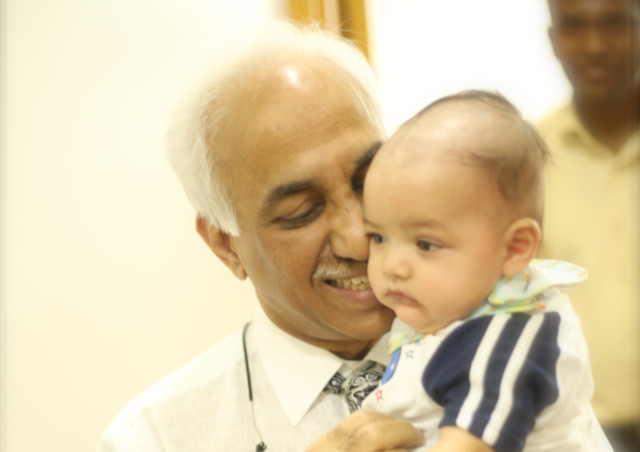
Susan* couldn’t believe the blue line on the home pregnancy test when she saw it. She hadn’t expected to get pregnant on her first trial. Married only a few months, she hadn’t waited to try naturally before consulting a gynaecologist to expedite her chances.
“I had finally met the man I wanted to spend my life and create a family with after searching for a long time,” says Susan, who had suffered a failed marriage. “I’ve always believed I’m one of those women who are born to be a mother and I was already in my late 30s when I remarried. So I did not want to wait and see if it happened itself before consulting someone.”
Susan received injections for increasing the size of her eggs and in a few weeks she had conceived. She got to know last year that she has a large fibroid in her uterus but the doctors told her it would still be possible for her to conceive.
“Everything seemed fine except for the occasional spotting. I had no annoying symptoms of pregnancy, such as morning sickness or fatigue. I continued working, exchanging notes with other young mothers at work.”
Eight weeks into her pregnancy, on December 18, 2013, she visited her doctor for the weekly progesterone injection to hold the spotting when the sky came crashing down on her.
“The doctor suggested a scan that day. Each time we did a scan, I’d anxiously waited and been thrilled to hear that tiny heartbeat. But that day, it wasn’t meant to be. It was devastating. Why me? There were older women who had healthy, normal pregnancies, why not me? Did I not treat my body well? Depression, guilt, anger all came together. But it hasn’t deterred me to try again.”
“Everyone feels sorry for those who don’t have children. But the category who are able to conceive but keep losing the pregnancy is even more pitiable because they’ve experienced the pregnancy, their hopes rise and they lose the pregnancy again and again,” says Dubai-based fertility specialist Pankaj Shrivastav. “I can’t say whether it’s an apparent increase that people are now more aware and so are coming to fertility centres or whether the problem of recurrent miscarriages or pregnancy loss has actually increased. We’ve had patients who’ve had miscarriages eight or ten times. This happens because of ill advice from general gynaecologists who don’t deal with this [branch of infertility] and people who tend to think that fertility treatment is only for people who can’t conceive.”
Shrivastav is a pioneer in fertility medicine in the UAE. He established UAE’s first fertility unit, the Dubai Gynaecology and Fertility Centre (DGFC), and served as its deputy director for 13 years before starting Conceive in Sharjah in 2004. Shrivastav has been instrumental in the birth of 2,500 babies in the UAE, including the DGFC’s first IVF babies in 1992.
“Traditionally pregnancy loss is defined as loss of three pregnancies. One loss is traumatic enough, two can physically break your back and then to tell a woman to try once more before investigating is highly unfair.”
Suhaila* tried to get pregnant naturally after her marriage seven years ago. She acknowledges both her husband and she being in shock, followed by denial, when they discovered they both would need treatment.
“It’s not easy. The more treatment we did the more it affected us — physically, mentally — you kind of put your whole life on hold because every time you went through treatment you tried to do the best. Should I exercise, shouldn’t I? Once I did and miscarried. Then second time I didn’t and still miscarried. You try all things and they play with your head. You take all these injections ... It may all seem worth it but it is hard at the time,” says Suhaila.
Thirty-seven-year-old Suhaila miscarried six-seven weeks after her first and second round of treatment. Not able to watch her go through all the pain, her husband told her to stop. But Suhaila didn’t give up hope. She got him to agree to one last treatment, this time with advanced genetic screening, and was blessed with twins last month.
Loss of pregnancy happens due to a small chromosomal defect in one of the parents, says Shrivastav.
“It’s a random event, found in some couples. They may have the right number of chromosomes. The defect is recessive because they are normal. But when an egg mates the sperm, this balanced chromosomal abnormality can become imbalanced so the embryo which is formed is abnormal. Suhaila came to us because she couldn’t conceive and then with treatment she could but lost each pregnancy. Each time she would become pregnant and a baby sac would form. However, one time it was empty, another time there was a foetus but the heartbeat stopped. We decided to screen her through pre-implantation genetics diagnosis (PGD). We took the eggs out and fertilised them with her husband’s sperm and then biopsied the embryo. Biopsy is done on the third or fifth day. It’s a very delicate thing but allows us to study the full chromosome content of the cell. Only nine embryos kept growing till day five, when we biopsied. We found seven to be completely abnormal. But implanted the other two and now she has twins.”
Both Susan and Suhaila happened to be in their late 30s, so Shrivastav advises not to wait so long to approach a specialist. Intra-familial marriages can also definitely throw up an increase in chromosomal abnormalities. If there is a recessive gene in two cousins it can become dominant in the offspring. Lifestyle too is an important factor.
“The average rate of miscarriages is 15-17 per cent. Once a woman crosses 40, the chances go up to 40-45 per cent. Deferring pregnancy to late 30s is not a good idea. Unfortunately people have unrealistic expectations from their fertility. They feel let’s enjoy life we’ll get pregnant as and when we can. That doesn’t really happen. It’s less likely to happen on demand after 35.”
— Dr Pankaj Shrivastav heads Conceive Gynaecology & Fertility Hospital in Sharjah. For more information log on to Conceiveuae.net
*Susan and Suhaila are women residing in the UAE. Their real names have been withheld on request.













